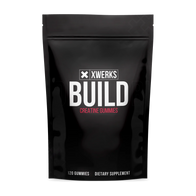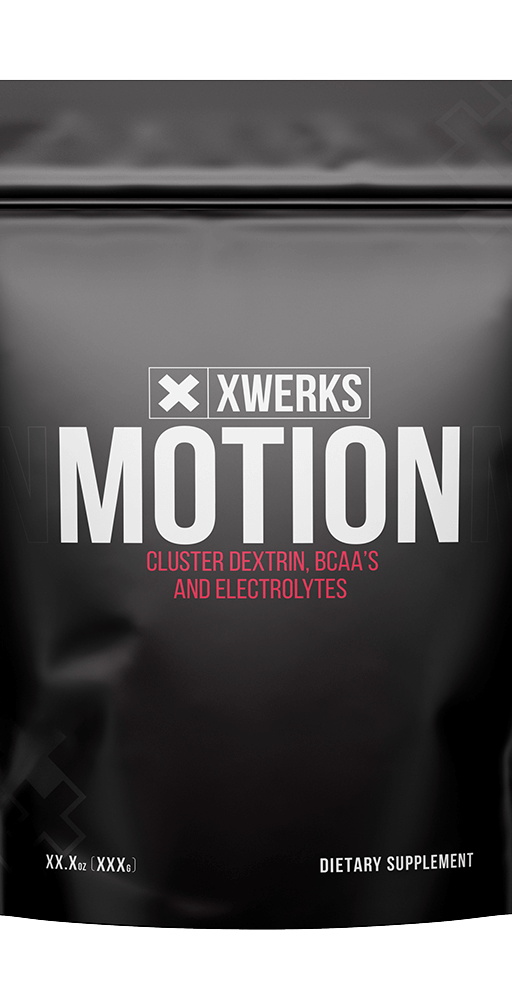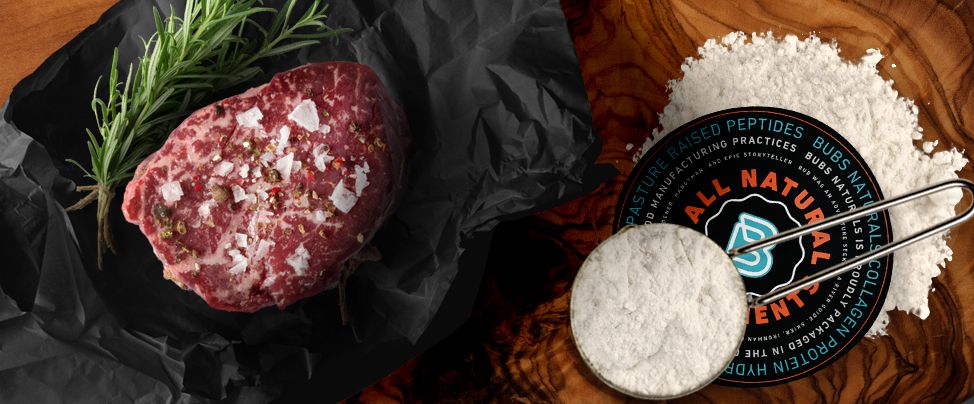You’ve probably heard of collagen protein. This supplement is growing rapidly in popularity among athletes and those that are health conscious thanks to its wide array of benefits. Read on to learn what collagen is, how it benefits us, and what you should look for when shopping for collagen supplements.
What Is Collagen?
Collagen is a protein that makes up nearly 40% of the total protein in the human body, making it the most abundant protein in our bodies. It’s an integral part of the connective tissue found in our skin, joints, muscles, bones, organs, blood vessels, eyes, tendons, and more.
Its unique structure allows for parts of our body to both flexible and rigid at the same time. Think of how skin is both firm yet elastic—these properties are largely due to the skin's collagen content.
The Different Types of Collagen
There is more than one type of collagen protein. In fact, in the human body there are 28 known different types of collagen proteins, which we break into five main types, or subgroups:
- Type I
- Type II
- Type III
- Type IV
- Type V
Types I, II, and III make up between 80-90 percent of the collagen in the body and are found primarily in our joints, skin, bones, digestive tracts, blood vessels, and lungs, while type IV is largely found in skin cells.
Where Do We Get Collagen From?
While the human body does make its own collagen, it needs the correct amino acids to do so, many of which we obtain through our diet. Consuming collagen-rich foods is the way that our ancestors would have acquired many of the building blocks to make up the collagen in their bodies. The problem today is that most of us do not eat foods high in collagen.
It is largely the undesirable parts of animals that contain high quantities of collagen. Think bones, organs, eyeballs, fish heads, and chicken feet. Because humans no longer eat every part of the animals that we use for food, many of us do not get enough collagen through our diets alone.
What Does Collagen Do?
1. Protects Joint Health and Function
Joint pain is a huge problem for many athletes. Joints are the connective tissue found between bones. When your knees, ankles, shoulders, hips, or wrists ache, it is likely a sign that your joints are suffering.
Joint pain is often a result of overtraining or injury. In the short term, this pain can hinder your performance and even reduce the frequency and intensity of your workouts. Long term, damage to your joints can result in an inability to perform and can hinder your daily quality of life.
Protecting the health and function of your joints is important at any age. Multiple studies on athletes have found collagen supplementation to help improve joint pain and protect athletes from joint deterioration.
In one of these studies, 147 athletes were given either 10 g collagen hydrolysate or placebo daily for 24 weeks. This trial found improvements in joint pain for the athletes in the collagen hydrolysate group.
2. Improves Skin Health and Appearance
One of the most well-known benefits of collagen has to do with our skin. Many studies have found collagen to boost skin health.
As humans age, our skin changes from smooth, firm, and elastic to wrinkly, saggy, and dry. This change is largely due to a reduced production of collagen as we age. Collagen allows our skin to be stretchy and firm, and with less collagen production, our skin’s appearance suffers.
In a randomized, double-blind, placebo-controlled study published in the Journal of the Science of Food and Agriculture, researchers found that oral supplementation of bioactive collagen hydrolysate enhanced skin elasticity and moisture while decreasing wrinkles and roughness.
These benefits are hypothesized to be thanks to the collagen supplement’s ability to boost the body’s production of both its own collagen and other proteins involved in skin health.
3. Protects the Digestive Tract
Our digestive health is critical to our overall health and wellbeing. It is through digestion that vitamins, minerals, and other nutrients are broken down from food and delivered throughout our bodies. Additionally, the health of our gastrointestinal (GI) tract protects us from insult from foreign invaders, such as bacteria or viruses that are found in the food that we eat.
Our digestive tracts are flexible, with connective tissues sealing off the GI tract from the rest of the body. Having our GI tracts remain flexible and secure helps to protect us from digestive troubles, inflammation, and disease.
Because collagen is largely responsible for the flexibility of the GI tract, and because it is a primary component of the connective tissues found within, proper collagen production is critical for optional digestive health. Collagen supplementation may help to keep our digestive tracts functioning as they should, although more research is needed to confirm this benefit.
4. Enhances Muscle Mass Gain
One of the primary reasons that athletes use protein powders of all varieties is as a tool to expedite muscle gain. Collagen protein, too, has demonstrated efficacy at helping athletes gain muscle.
In a study of elderly men published in the British Journal of Nutrition, collagen used in combination with a 12-week resistance training program yielded greater increases in muscle strength than resistance training alone.
While more research is needed to determine how collagen helps to increase strength when used after exercise, it is believed that collagen may stimulate muscle growth and muscle protein synthesis.
5. Increases Bone Density
As we get older, our bone density tends to decline. While there are numerous factors that influence this, one of them is collagen production. Each of our bones contains collagen, and when collagen production decreases as we age, so does our bone density.
Preliminary studies in rats have found hydrolyzed collagen to increase bone density, while those examining human cartilage-producing cells have found that collagen supplementation stimulates collagen production. These early studies suggest that collagen supplementation may help to protect bone density as we age.
6. Supports Heart Health
Cardiovascular disease is one of the leading causes of death worldwide. As you age, your blood vessels become less flexible. These stiff, fragile blood vessels increase the risk of atherosclerosis and cardiovascular disease as your blood vessels are responsible for carrying blood to and from your heart.
Collagen makes up much of our blood vessel walls and is to thank for their flexible but firm structure. As with many other parts of the body, a reduction in collagen production as we get older can negatively impact the health and function of our blood vessels, and with them, our cardiovascular health.
In a study of 31 healthy adults, 16 grams of supplemental collagen daily for six months was found to result in decreased artery stiffness compared to before collagen supplementation. This same study found improved cholesterol levels, with an increase in the levels of HDL cholesterol, also known as “good” cholesterol. Taken together, these findings suggest that collagen supplements can support heart health.
7. Protects Hair and Nail Health
Another great aesthetic benefit of supplementing with collagen is the appearance of hair and nails. When your body doesn’t make enough collagen, it can result in brittle and dull nails and hair. Supplementing with oral collagen has been found to strengthen both hair and nails. Over time, stronger, healthier hair and nails can lead to shiny, long hair and strong nails.
8. Relieves Arthritis Pain
Researchers have found collagen supplementation to help relieve pain in both osteoarthritis (OA) and rheumatoid arthritis (RA) patients.
In a study of 52 osteoarthritis patients, chicken type II collagen supplementation was examined for its ability to help with OA symptoms. Following 90 days of supplementation, researchers concluded that the collagen helped to decrease pain and enhance mobility.
Another study of 274 RA patients found that type II collagen supplementation helped to reduce painful, swollen joints. In this study, 20 micrograms/day was found to be more beneficial than 100, 500, or 2,500 micrograms/day.
9. Regulates Blood Sugar Levels
Spikes in blood sugar can be particularly dangerous for the health of those with diabetes or prediabetes. A healthy diet, exercise, and certain supplements can help people control their blood sugar levels.
One study examined the efficacy of marine collagen peptides (MCP) from deep sea fish in helping those with type II diabetes and high blood pressure. 50 healthy adults and 100 adults with type II diabetes and primary hypertension were enrolled in a randomized double-blind study where they were given either a placebo or MCPs twice daily for three months.
For adults with type II diabetes, MCP supplementation was associated with a reduction in fasting blood glucose levels and blood pressure, leaving researchers to conclude that MCP may benefit those with type II diabetes by helping to regulate blood sugar levels.
How Does Collagen Work?
Collagen, just like every protein, is comprised of amino acids, which are known as the building blocks of protein. Much of collagen’s benefits are thanks to four amino acids in particular:
-
Arginine: Arginine is central to our cardiovascular health. It stimulates nitric oxide synthesis, resulting in enhanced blood flow, and boosts the health of our blood vessels.
-
Glutamine: Glutamine is important for our digestive health thanks to its involvement in protecting our intestinal mucosa, a layer of mucus that is pivotal to digestive health.
-
Glycine: Glycine plays a role in our body’s ability to heal thanks to its involvement in DNA and RNA synthesis.
-
Proline: Proline is necessary for the elasticity of much of our body, such as our skin, blood vessels, and digestive tracts. It is proline that is particularly important for our skin’s appearance.
Getting Enough Collagen
There are two routes that you can use to obtain collagen protein: food and supplements.
Because collagen is found in high concentrations in connective tissue and bone, it is found in high quantities in foods like bone broth, pig’s ears, chicken feet, organs, and other parts of animals that we rarely eat. For most of us, adding in daily bone broth is the most realistic way to increase our collagen consumption via diet on a regular basis.
For those who want to reap the benefits of collagen without having daily bone broth, supplementation is a simple and effective way to do so. There are many varieties of collagen supplements, which can make choosing the best one for you challenging.
The options break down into two broad categories: collagen or collagen peptides. Collagen supplements can be derived from many sources, such as fish, chicken, cow, or eggshell membranes.
Collagen peptides, also known as hydrolyzed collagen, contain collagen in an easier to digest form. The peptides are simply collagen proteins broken down into shorter chains, which increases their bioavailability. Collagen peptides contain the same benefits as traditional collagen supplements, but in a more accessible form.
How to Boost the Effectiveness of Collagen Supplements
When you consume a collagen protein supplement, your body doesn’t simply absorb it as is. What happens first is that the collagen is broken apart into the separate amino acids, and then your body later puts these pieces back together where your body needs them.
In order for your body to be able to effectively create its own collagen from the collagen that you take in through supplements or your diet, it needs some other nutrients. Additionally, other lifestyle factors can influence how well your body synthesizes collagen.
In order to increase the production of collagen as you supplement with collagen, try to do the following.
Reduce Stress
Chronic stress is harmful to the body in numerous ways, one of which has to do with collagen. When we experience too much stress and the related high levels of the stress hormone cortisol, the integrity of collagen throughout the body is harmed.
By working to keep your stress levels low, you can help to keep the collagen in your body stable. Try things like sleeping 7 or more hours each night, exercising, meditating, and doing activities that help you to feel calm and happy.
Exercise More
Collagen and exercise support one another bidirectionally. Not only does collagen supplementation appear to help with muscle building and joint discomfort, but exercise can make your collagen supplement more beneficial. Studies have found exercise to boost the production of collagen via an increase in mRNA coding for collagen.
Get Enough Vitamin C
If you are serious about boosting your body’s ability to produce collagen, you will need to ensure that you’re getting enough vitamin C. Vitamin C plays a central role in collagen synthesis, meaning that your body will not be able to make more collagen without vitamin C.
Researchers found that participants who used a vitamin C-based facial moisturizer for 60 days experienced significantly greater collagen synthesis in their skin than did those who used a moisturizer without vitamin C.
Stop Smoking
If you’re someone who uses tobacco products, one of the best things you can do to support collagen production is to stop using tobacco. This includes cigarettes or vape products, so do not think that you’re safe if you are vaping tobacco rather than smoking cigarettes.
Smoking directly decreases collagen production while simultaneously degrading your body’s collagen. This is a double whammy when it comes to your body’s collagen levels.
Final Thoughts
Collagen supplementation benefits numerous aspects of our overall health and wellbeing. Because our diets no longer closely resemble those of our ancestors, taking collagen supplements is one of the best ways to provide your body with the building blocks that it needs to produce its own collagen. Look for collagen peptides, also known as hydrolyzed collagen, to boost its bioavailability, and with it, its benefits.






















